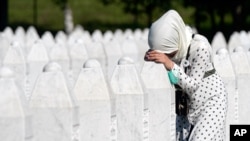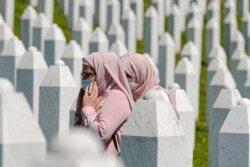Saturday marks the 25th anniversary of the Srebrenica massacre during which some 8,000 Muslim men and boys were killed in a mass execution by Bosnian-Serb military forces.
Crowds gather each year for the solemn occasion at the Srebrenica-Potocari memorial and cemetery in Bosnia - Herzegovina, but this year attendance was limited to only a few survivors because of the ongoing coronavirus pandemic.
Video messages from several world leaders were to be presented during Saturday’s commemoration event.
"It's been profoundly moving for me at every time, every opportunity to continue to add my voice to those across the world who grieve for the family of those killed. To support the ongoing effort to seeing justice for those lost and recover their remains and bring them home, to a final resting place," former U.S. President Bill Clinton said in a video message.
Clinton presided over the Dayton Peace Agreement that put an end to the three-and-a- half-year-long Bosnian War that began in 1992.
U.S. Secretary of State Mike Pompeo vowed in a prerecorded video message the U.S. would “never forget that tragedy” and said the country grieves with the families of the victims while standing with “our great friends in Bosnia and Herzegovina.”
Britain’s Prince Charles said in his video presentation, "The terrible events of July 1995 confirmed as genocide by international courts are a dreadful strain on our collective conscience. The international community failed those who were killed, those who somehow survived and those who endured the terrible loss of their loved ones. By remembering the pain of the past and learning its lessons, we can together resolve that it must never happen again."
The Serbs buried the bodies in mass graves around eastern Bosnia. Body parts are still being uncovered. At least 7,000 of those who were killed have been identified through DNA tests.
An international court convicted former Bosnian Serb military chief Ratko Mladic of genocide, war crimes and crimes against humanity, and sentenced him to life imprisonment in 2017. Former Bosnian Serb president Radovan Karadzic was convicted in 2016 for war crimes and his role in the massacre, which was declared an act of genocide in 2004.












